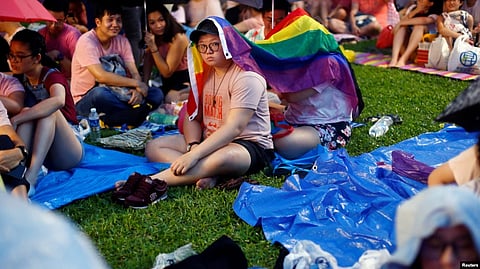Singapore will decriminalize sex between men but has no plans to change the legal definition of marriage as being between a man and a woman, Prime Minister Lee Hsien Loong said on Sunday. Lee said Singaporean society, especially young people in the city-state, are becoming more accepting of gay people.
"I believe this is the right thing to do, and something that most Singaporeans will now accept," he said in his annual national day rally speech, adding that the government would repeal Section 377A of the penal code, a colonial-era law that criminalizes sex between men. It was unclear when exactly the law would be repealed. Singapore becomes the latest Asian country to move closer to ending discrimination against members of the LGBTQ community.
In 2018, India's highest court also scrapped a colonial-era ban on gay sex, while Thailand has recently edged closer to legalizing same-sex unions. In Singapore, under Section 377A, offenders can be jailed for up to two years under the law, but it is not currently actively enforced. There have been no known convictions for sex between consenting adult males for decades and the law does not include sex between women or other genders. Lesbian, gay, bisexual, transgender, and queer (LGBTQ) groups have brought multiple legal challenges attempting to strike down the law, but none has succeeded.
In February, Singapore's highest court ruled that since the law is not being enforced, it does not breach constitutional rights, as the plaintiffs had argued, and it reaffirmed that the law could not be used to prosecute men for having gay sex. Resistance remains to repealing the law, especially among certain religious groups including Muslims, Catholics and some Protestants, Lee said. Singapore is a multi-racial and multi-religious society of 5.5 million, of whom about 16% are Muslim, with bigger Buddhist and Christian communities. It has a predominantly ethnic Chinese population with sizeable Malay and Indian minorities, according to the 2020 census. Lee stressed his government's continued support for the traditional definition of marriage.
"We believe that marriage should be between a man and a woman, that children should be raised within such families, that the traditional family should form the basic building block of society," he said. Singapore will "protect the definition of marriage from being challenged constitutionally in the courts," he said, adding: "This will help us repeal Section 377A in a controlled and carefully considered way."


